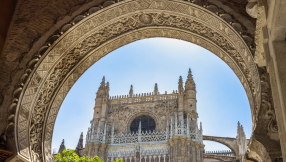
King David was a great king, a great warrior and – in spite of some terrible character flaws – a great man of God. But in one of the most revealing stories about him he hardly figures at all. The attention is all on his "three mighty men" – the greatest heroes of his reign.
We'd be hard pressed to recall their names, unless we know our Bibles very, very well indeed. But in their day they would have been the equivalent of the great athletes or sportsmen of our own time. Josheb-Basshebeth "raised his spear against 800 men, whom he killed in one encounter" (2 Samuel 23:8); Eleazar son of Dodai "stood his ground and struck down the Philistines till his hand grew tired and froze to the sword" (verse 10); Shammah son of Agee fought in a field of lentils and "struck the Philistines down, and the Lord brought about a great victory" (verse 12).
These rather bloodthirsty exploits are what gave them their reputation, but it's another episode that reveals something of the character of David – and tells us a lot about leadership, too.
It was evidently before David became king, and he and his men had created a stronghold in the Cave of Adullam. He longed for water from the well at Bethlehem, which was held by the Philistines, and without saying anything the three mighty men broke through their lines and brought some back for him. David, however, refused to drink it but poured it out as an offering to God. "Far be it from me to drink it!" he said. "Is it not the blood of men who went at the risk of their lives?"
This story tells us a great deal about leadership today.
1. It shows the respect in which David was held
The three mighty men, honoured as they were, weren't ambitious for themselves; they only wanted to honour him. They put themselves at risk and went far beyond what they were contracted to do because they wanted to serve him to their utmost. Great leaders are able to inspire great loyalty. Their staff or followers don't just serve for the money; they go beyond the call of duty because they see something in their leader that's worth following.
2. It shows the respect in which David held them
If he had accepted what they'd done it would have set a terrible precedent, as though reckless or extravagant acts were the way to his favour. It would also have meant he approved of men risking their lives for his convenience, which he did not. So he had to find a way of graciously rejecting what they'd done while continuing to honour them. Pouring out the water as an offering to God was the perfect way of doing this. It said he valued their gift, without taking personal advantage of it.
Good leaders don't let themselves be put on a pedestal, no matter how great their talents are. They know that God comes first and that wherever someone is in their organisation, they're on the same level before God.
There's something of a cult of leadership in today's Church. It's a very worldly way of looking at how God chooses to run his church. Leaders can be expected to be powerful, charismatic figures who impose their authority on the church. All too often they expect the lion's share of the rewards of a 'successful' ministry – like prosperity preachers who enrich themselves from their congregations. This story says to us that true leadership is humble and gracious, and that a genuine leader knows where to draw the line in accepting the service of others. Both leaders and followers serve the one God together.
Follow Mark Woods on Twitter: @RevMarkWoods













